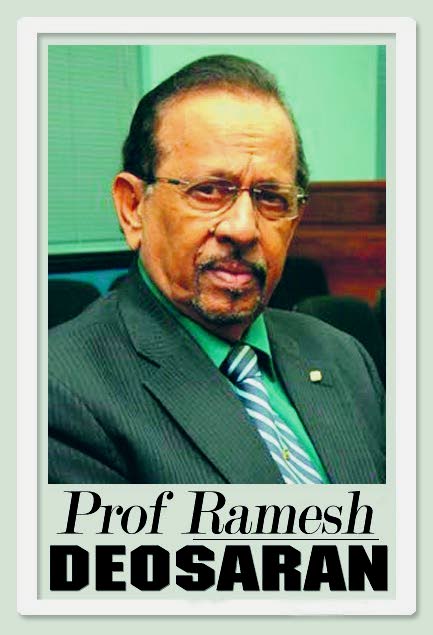Microbes, not missiles

Prof Ramesh Deosaran
Microbes (viruses) are minute living organisms that cause disease, even death.
Missiles are weapons, especially nuclear weapons, directed by remote control. As the coronavirus encroaches, PM Dr Keith Rowley and his Cabinet stoutly wrestle with the challenges.
Personal sacrifice for collective safety. Nationwide support is necessary to avoid a health and economic catastrophe. As I was examining the difference between virus and bacteria and the escalating worldwide border and business shutdown over the pandemic threat, I came across an epidemic prediction by novelist Sylvia Browne and a predicted microbes-before-missiles catastrophe by computer scientist Bill Gates.
In her book, End of Days, Ms Browne says: “In around 2020 a severe pneumonia-like illness will spread throughout the globe, attacking the lungs and the bronchial tubes and resisting all known treatments. Almost more baffling than the illness itself will be the fact that it will suddenly vanish as quickly as it arrived, attack again ten years later, and then disappear completely.” Ms Browne describes herself as “a prophetess.” She (with with Lindsay Harrison) made her prediction in 2008, the year of the infamous financial crash (which she didn’t predict.)
Now I read and listen a lot, but believe less. More media, less credibility. People of Ms Browne’s trade usually make a hundred predictions with only one or two coming true or approximating the prediction. And followers, anxious to overcome life’s uncertainties, faithfully cling to the one or two. I subsequently came across computer scientist Bill Gates’ prediction that “a global catastrophe will happen not with nuclear missiles but with a highly infectious virus,” taking millions as the flu did in 1918.
He said this in 2015, complaining how unprepared we are, how much money is spent on arms with little on medical research, etc. Gates’ reasoning reminds me of how under-funded we are in the critical areas of medicine, environment, crime, etc, making our policies expensive hit and miss affairs.
Given the constant toxic pressures put upon the environment, ocean and air pollution and the alarming scientific statistics, I believe end-of-the world is a sooner or later catastrophe. Nature can only take so much. If not from an intemperate hand pressing the nuclear button, then from virulent toxicity. Microbes, not missiles. On March 3 last year, this column stated: “There is a growing literature around the world – religious and scientific – pointing to the imminent apocalypse.
The religious rest their case on the bible’s revelation about the ‘sinful world.’ Scientists rest their case on climate-change severity, rapid rise in worldwide pollution and natural disasters. Few even point to the closeness of the nuclear button to intemperate hands and heightened international tensions.”
So there seems to be at least four alternatives for the end-of-the-world – a poisoned environment, a natural disaster (eg earthquakes) the nuclear button (technological mishap) or a deadly virus. Doomsday disasters became dramatised by movies like Earthquake, 2012, Day After Tomorrow, The Flood, etc. Virus epidemics were imagined. Today’s pandemic reflects movie fantasies like Contagion, Epidemia, Breakout, etc. Fiction is now fact.
Gates is right. The world appears rather unprepared for a virus epidemic. But then, how can we prepare for an unknown but deadly virus, or one that rapidly mutates? If the best scientific talent of the world could have assembled in the US to make the Atomic Bomb, why can’t the best expertise now assemble to beat the coronavirus pandemic? In the midst of the infectious pandemic-driven fright up comes a consoling rationale through social media.
This consolation welcomes the cooling-off period offered by the virus scare – staying inside, cut down travel, stay away from crowds, eat and drink less. Less crime too. In other words, the world seemed to be travelling too fast with all the stresses and tensions that went with it. It needed a slow-down. But are the stresses, tension, fears, food-fights, economic and social dislocations from the pandemic worth the consoling respite?
The contagion is now exponential. Hopefully, an effective vaccine will arise at the end of the year. Even so, and as welcome as the institutional and financial assistance by governments are, the task to reconstruct the economy and social order will be extremely pressing after the pandemic ends. If it ends.


Comments
"Microbes, not missiles"